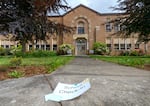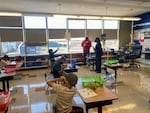When a principal leaves a school, they leave a school community — from students and their families to staff.
Colleen Cash teaches physical education and yoga at Rigler. In her five years at the Northeast Portland elementary school, she’s had four principals.
“The first time that we lost the principal was the principal that hired me,” Cash said. “And I bawled my eyes out in front of the staff because I was really sad we were losing this person who was so dear in my heart.”
The next time, Cash said she “put a shell of cynicism around her heart,” with the shell getting bigger with each loss. It took a recent meditation retreat for her to realize being cynical wasn’t helping.
Over the years, she said school staff have had to start over, sharing routines and procedures with a new administrator knowing that they may want to change everything.
“It kind of feels like you’re just treading water, instead of… actually moving forward,” Cash said.

The Rigler garden is part of La Colectiva de la Comida, a teacher-run project created to address food insecurity for Rigler students and families.
Kristyna Wentz-Graff / OPB
On the academic side of things, Cash’s concerns are borne out by state test scores, showing Rigler’s reading and math results stuck well below Oregon averages, with little movement in recent years.
Meantime, parents have been pushing concerns to the highest levels at Portland Public Schools. In March, the school’s PTA, Padres Unidos, wrote a letter to district leadership and school board members blaming Rigler’s principal turnover on PPS systems. The parents mentioned both Myrna Muñoz, who served as principal from 2018-2019 to the beginning of this school year, and Keyla Santiago, who took over as interim.
“We understand Directora Myrna Muñoz’s resignation to be the result of a systemic lack of material and professional resources and support. Systemic failures have become doubly evident in the recent decision by Interim Principal Keyla Santiago to not apply for the permanent principal position,” Padres Unidos wrote.
“Each time a principal leaves, it becomes even more clear that the position is not designed for success.”
Padres Unidos’ demands point to the constraints facing past principals. The parents group wants money for a full-time assistant principal and community agent positions. And the group called for a cap on the amount of time Rigler’s principal has to be away from the school, as well as adequate compensation for the job. Finally, the letter pressed for an explanation of how the district has implemented recommendations from an audit conducted by the Oregon Secretary of State’s office in 2019. The audit showed turnover and other systemic problems plaguing PPS and hitting schools like Rigler the hardest
The PTA at Alameda, a nearby school that, like Rigler, feeds into Beaumont Middle School, wrote a message in support of Rigler, pointing out the inequities.
“Our children’s lives and schooling are interconnected,” the message from the Alameda PTA Executive Committee reads. “Our students and families see the differences in support between the two schools.”
Portland district officials say turnover is expected for urban school districts like Portland. They say shortages of qualified educators — teachers and principals — affect hiring. The district developed a type of “grow your own” program to train aspiring principals, and offers mentorship for first and second year administrators. But PPS is confronting a problem that’s far bigger than the biggest district in Oregon.
Principal turnover: not just a Portland problem
“Turnover is a national issue,” Jacqueline Roebuck Sakho, an assistant professor in the Graduate School of Education and Counseling at Lewis & Clark College, told OPB. “This is not an issue that is only centered in Oregon, and definitely not only centered at PPS.”
Roebuck Sakho said there’s a tension in the role of a principal today. Training sets principals up to be collaborative and exercise distributed leadership, but then they end up in a school system that Roebuck Sakho calls “hierarchical” and “managerial” in nature.
Coming into a school like Rigler, with teachers leading things, Roebuck Sakho said the preparation of the principal moving into the building is key.
“Are they being prepared like it’s 1955, the year after Brown [vs. Board of Education], or are they being prepared to step into buildings that are run [...] where we have teachers as leaders, where we have the principal as the instructional leader?” Roebuck Sakho said.
But schools aren’t necessarily set up for innovative principals who are ready to change things. Roebuck Sakho said schools don’t always practice what they preach.
“Most of the districts here in the state of Oregon can give you a powerful equity statement and equity vision, however, I’m not quite sure they’ve connected that — the theory — to the actual practice of what that looks like.”
A former Rigler administrator, who OPB is not naming to protect them from harassment, said the job was stressful and lacked support and understanding from the district. They became physically sick, and felt so busy during the day that there was no time to eat or use the restroom.
“I understood that [...] when there was more to do, they were going to want me to be doing it, and I’m already spread,” the administrator said. “Those people in that building, they work hard, and they’re not treated that way. Everything that comes out from district office, it feels like they’re accusing the teachers of not doing enough.”

Rigler Elementary School in Northeast Portland is one of 19 Title 1 elementary schools in PPS, serving families with high rates of mobility or poverty.
Kristyna Wentz-Graff / OPB
But it’s not just about support, the former administrator said; it’s also about how schools are funded. This former administrator said the district needs to understand that in order to adequately serve communities like Rigler’s, they need to serve their unique needs.
“They should follow their own advice and center equity by bringing whoever the principal is to the center of the work,” the former principal said.
And principals matter. A recent analysis of educational research by the Wallace Foundation shows the impact of an “effective principal” on student achievement is “nearly as large as the effect of having a similarly effective teacher.” Or maybe more: a teacher’s impact may be concentrated on a single grade level, while a principal will affect a student’s success for the entire time they’re at a school.
Principals affect other outcomes too, like teacher turnover. Research finds when principals leave, teachers do, too.
And at Rigler, despite the strong community, some teachers have left.
“That collective power, it keeps people here, but this repeating story of turnover and lack of trust, and no voice, has really sent a lot of people away,” said Rigler teacher Stephen Gunvalson.
Among those who left is Angela Bonilla, who worked at Rigler as an educational assistant and then teacher from 2014 to 2018.
Under principal TJ Fuller, at Rigler, Bonilla said things were turning around. There was consistency within the school system, and routines were in place and enforced by administrators. She said there was “community building.” Fuller led Rigler for two years before it was announced that he’d move to Cesar Chavez School, a K-8 in North Portland.
Bonilla said the new environment at Rigler wasn’t sustainable for her, and wasn’t supportive of students.
“I had to leave,” Bonilla said. “I wrote in my letter, I’m leaving because I can’t become the teacher these kids deserve here.”
She followed Fuller to Cesar Chavez for a year before landing at Scott Elementary.
Rigler and Scott are similar in a lot of ways. They’re 13 blocks apart on Northeast Prescott Street, they serve a majority of students of color, and offer Spanish immersion programs. But unlike Rigler, Scott principal Megan McCarter is finishing up her third year in the role.
Bonilla said it’s a night and day difference between the schools.
Bonilla said McCarter works collaboratively and finds leadership opportunities for others at the school. Bonilla is on the senior leadership team, which she said is majority women and people of color. She said McCarter, who had principal experience before coming to Scott, serves as a buffer for what gets handed down from the district.
“My ideas are valued, my input is important, I have planning time,” Bonilla said.

Gov. Kate Brown visits Scott Elementary students on the first day of hybrid learning April 1, 2021.
Elizabeth Miller
For a Rigler administrator to be successful, Bonilla echoes what a number of parents and teachers still at Rigler are saying: that the district needs to do more.
“Maybe part of the problem is that it’s an impossible job, and that there needs to be more support,” agreed Rigler parent Jessie Marquez.
“That position is eating people up, and they’re leaving because it’s not worth it.”
PE teacher Colleen Cash said a Rigler principal once told her she’d make a good school leader. Cash said she was flattered, but didn’t see how she could have the job and still have work-life balance.
“It actually dissuades other people from stepping into leadership, which is a shame,” Cash said.
Is the job sustainable?
The 2019 audit from the Oregon Secretary of State included recommendations for how to better support principals and decrease turnover. They included providing incentives and additional support, as well as regularly tracking teacher and principal turnover.
When you ask parents and teachers what the next Rigler principal needs, they have specific suggestions on how to support the Rigler community and serve its needs. They suggest translation services, or providing resources so Rigler families can remain engaged with the school and the district. That starts with a principal who’s in the school more, where they can build relationships and a stable foundation.
The district said it provides additional funding and programs to Rigler and other PPS schools, and that a school like Rigler has “more resources” than other schools in the district that don’t have the need. Rigler receives additional federal and state funding for serving a large proportion of students from low-income families. According to an email dated March 10, Rigler receives a Title 1 allocation of “approximately $185,000 that school administrators use to support students and families based on identified needs.”

Magali Rabasa attended a meet and greet with Rigler’s incoming principal Chris Silvas, May 28, 2021. When asked what parents wanted in a principal, she says they want a principal who will be at the school as much as possible and will stick around.
Kristyna Wentz-Graff / OPB
But parent Magali Rabasa said the district doesn’t recognize that leadership is a priority.
“The citing of the numbers, of the dollars, the resources, the programs … leadership is essential,” Rabasa said. “None of that works if there isn’t that stability.”
Finally, Rigler parents say they need better engagement with the district — to be treated as partners with the school in their children’s education, after the efforts they’ve made.
“The district needs to give us more, the district needs to provide what our school is missing, because we’re missing a lot,” said Rigler parent Alma Mora.
Rigler parents also point out the disparities in funding school by school through the foundation system. School foundations are organizations where parents and community members raise money for individual schools. In Portland, schools that raise a significant amount of money must allocate one-third of its funds to a district-wide fund that awards the money to schools based on need. In 2020, the school foundations raised over $4 million, with $1.1 million of that going to schools serving underserved communities.
For the 2018-2019 school year, Alameda kept $127,076 from its school foundation (after giving the required amount to the district-wide fund). In 2019-2020, that number was $91,718. For the coming 2021-2022 school year, Rigler received $16,000 from the district fund.
“It’s very frustrating to have the proximity of Alameda knowing that it is one of those incredibly highly funded by their private foundation dollars schools, that it operates in a completely different economy of education than we do, because of the foundation model,” parent Magali Rabasa said.
The PTA at Beaumont Middle School, which serves both Rigler and Alameda students, pointed out the “many inequities” between the schools in a message supporting Padres Unidos, Rigler’s PTA.
“We recognize that some need societal solutions and that some result from and are exacerbated by white parents, fighting to preserve their status quo,” read the message signed by the Beaumont PTA’s executive board. “Still others, like principal and teacher retention, along with staffing allocations, are within the District’s control.”
Other incentives the district provides include support and professional development opportunities, as well as direct communication with a district senior director. Senior advisor for racial equity and social justice, Dani Ledezma said the district is also looking at improving principal retention with its strategic plan process, which is underway now. PPS officials said there is no additional compensation for principals going to certain schools.

A colorful banner made by parents hangs on the playground for a meet and greet with the incoming Rigler Elementary School principal, Chris Silvas, May 28, 2021. The Northeast Portland school has seen several principals come and go, with the current principal at the school for eight months.
Kristyna Wentz-Graff / OPB
Over the last several weeks, new principal announcements have popped up on the PPS website. On May 7, a new Rigler principal was announced: Chris Silvas, a high school principal from Los Angeles, will be the principal next school year. Silvas was the only candidate under serious consideration that parents were aware of. In the release, the district calls Silva an “experienced, bilingual educational leader” from California. Silvas’ only elementary experience listed is at the beginning of his career, as a teacher in grades 5 and 6.
Parent Magali Rabasa was at a meet and greet with Silvas late last week. She said he asked what they wanted in a principal.
“Several of us parents immediately responded that we want a principal who will be at the school as much as possible, and who will stick, stick around,” she said.
With a departing assistant principal, Rigler’s leadership team will be all new next year.
But Rabasa said hiring new leaders doesn’t mean Rigler’s problem is solved. What matters is who stays.
